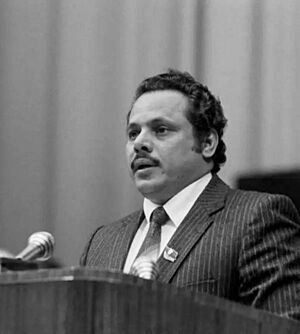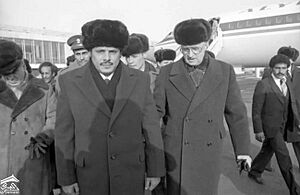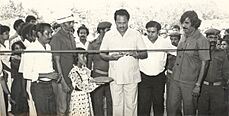Ali Nasir Muhammad facts for kids
Quick facts for kids
Ali Nasir Muhammad
|
|
|---|---|
|
علي ناصر محمد الحسني
|
|

Muhammad visiting the Soviet Union in 1982
|
|
| 2nd General Secretary of the Yemeni Socialist Party | |
| In office 21 April 1980 – 24 January 1986 |
|
| Preceded by | Abdul Fattah Ismail |
| Succeeded by | Ali Salem al Beidh |
| Chairman of the Presidium of Supreme People's Council | |
| In office 21 April 1980 – 24 January 1986 |
|
| Preceded by | Abdul Fattah Ismail |
| Succeeded by | Haidar Abu Bakr al-Attas |
| Chairman of the Presidential Council | |
| In office 26 June 1978 – 27 December 1978 Acting: 26 June 1978 – 1 July 1978 |
|
| Preceded by | Salim Rubai Ali |
| Succeeded by | Abdul Fattah Ismail (As Chairman of the presidium of Supreme People's Council) |
| Prime Minister of South Yemen | |
| In office 2 August 1971 – 14 February 1985 |
|
| Preceded by | Muhammad Ali Haitham |
| Succeeded by | Haidar Abu Bakr al-Attas |
| Personal details | |
| Born | 31 December 1939 Mudiyah, Dathina Confederation, Aden Protectorate |
| Political party | Socialist Party |
| Other political affiliations |
National Liberation Front |
| Awards | |
| Website | https://www.alinaser.com/ |
Ali Nasir Muhammad Al-Husani (born 31 December 1939) is a politician from Yemen. He was a very important leader in South Yemen before it united with North Yemen. He served as the country's president twice and was also the prime minister for many years.
Before Yemen became one country in 1990, it was split into two: North Yemen and South Yemen. Ali Nasir Muhammad was a key figure in the government of South Yemen. He was the Prime Minister from 1971 to 1985. He also became the head of state, or president, in 1978 and again from 1980 to 1986.
Contents
A Leader in South Yemen
In April 1980, the president of South Yemen, Abdul Fattah Ismail, stepped down. Ali Nasir Muhammad then became the new leader. Many people saw him as a more practical leader than the one before him.
His Policies as President
As president, Ali Nasir made some changes in South Yemen. He relaxed some of the strict government rules. He also tried to build better relationships with other countries. This included North Yemen, the neighboring country of Oman, and even Western nations. He wanted to have a more peaceful foreign policy.
The South Yemen Civil War

A major conflict started on January 13, 1986. Fighting broke out in the city of Aden between people who supported Ali Nasir and those who supported the former president, Ismail, who had returned to the country. This conflict is known as the South Yemen Civil War.
The fighting was very intense and lasted for over a month. Sadly, thousands of people died. In the end, Ali Nasir was forced out of power. He and about 60,000 of his supporters fled to North Yemen for safety. After he left, Haidar Abu Bakr al-Attas became the new leader of South Yemen.
Life After Leaving Power
Ali Nasir Muhammad was a member of two major political groups during his career: the National Liberation Front and later the Yemeni Socialist Party.
Role in Later Events
Even after losing power, Ali Nasir remained involved in Yemeni politics.
- During the 1994 Civil War in Yemen, he encouraged his supporters to fight alongside the government of the newly united Yemen. They fought against a group that wanted to make South Yemen a separate country again.
- In 2011, during a period of protests in Yemen, he was part of a group that wanted to help the country change to a new form of government.
- In 2015, after the government faced a major crisis, some reports suggested he might be chosen to lead a temporary government council.
Notable people
- Hassan Al-Salami, Minister of Education (1982–1986)
See also
- "Russian Translation" (2006) – A Russian TV show that includes a fictional story based on the 1986 civil war in Aden.


